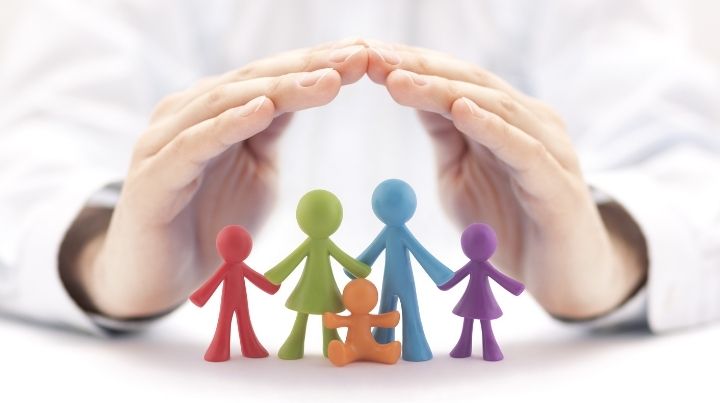A Safe Family: Tips for Protecting Your Loved Ones

How to Help Keep Your Family Safe
Having a safe family in this constantly changing world can be a challenge and a worry.
The 24-hour news cycle and the internet bombard you almost non-stop with troubling stories. Your children see and hear things you would never have imagined at their age.
Do the things your children see and hear trouble you as parents? If you are the good parent that I know you are, it probably does. After all, you just want them to have a safe and happy childhood, right?
One way to make that happen is to follow these four steps. They are simple steps that involve proactively spending time together. Then, work to pass on your safety, security, and preparedness information slowly, in a controlled and positive manner.
Spend Time Together
The American family changed as TVs reduced in size and cost, and more parents left home to join the workforce. The changes are even more dramatic with the fact that many kids and parents practically live on the Internet.
As this has happened, families spend less and less time together. Gone are the days when families eat, play, and watch TV together.
It is that separation that families who desire to be safer should overcome. After all, by being together, your family will learn from one another. And learning from one another is better than learning from some stranger on the computer or the TV, right? A safe family spends time together.
By spending time together, you impart many views and values to your family. Those include your views on safety, security, preparedness, values, and the world as a whole.
Many families have forgotten what it’s like to hang out together. So, why not read a book, or do something educational together? Go on a hike, skim through a book on local wildlife, play a board game, build a puzzle, take a road trip, etc.
I don’t know about you, but it’s the times spent together as a family that I remember most fondly from my childhood.
Why not give your kids the same fun memories?
Be Truthful With One Another
“Honesty is the best policy.” ~Benjamin Franklin.
Trust is a vital part of any relationship, even with your family. When your family asks you questions, be honest with them.
That honestly doesn’t include telling them an EMP is going to wipe out the planet. That is an over-exaggeration and will not make for a safe family – it will make for a scared family.
Stay with what you know is fact and avoid adding drama. Will an EMP wipe out the country? Who knows? What we do know is there is a potential for a grid down situation to happen. So, why not be prepared?
Will a terrorist attack them? Probably not, but there is a chance, just like there is a chance of being targeted by a criminal, etc. So, explain that bad people are out there. Explain that they should be observant and keep an eye out.
Explain what they should do if something happens.
Let them know that they will be okay because you have taught them what to do. Learn to talk to them about facing an emergency without scaring them.
Be Positive
As preppers, we understandably tend to focus on negative events. While we don’t usually intend to be negative, others think we are. Those others can include our family members.
Therefore, we should make a conscious effort to be positive as often as possible while becoming a safe family. When we’re positive, we’ll attract others who may be more willing to understand why we prepare. We need to show them by example that prepping is the ultimate act of optimism.
In the end, there are a lot of beautiful things that happen in our lives. Take the time to focus on and reinforce them to others.
Being positive will help everyone come together, be happy and learn in an encouraging environment.
Don’t Scare People
We all know that the world can be a scary place. That is especially true for children and people who may not be exposed to potential problems like many preppers are. As a result, knowing how to make your family safer can be difficult.
Because it’s a scary place, many people ignore what’s going on or put it out of their minds. Often, when reality hits, they don’t deal with it well.
Therefore, it is important not to scare people. When dealing with children, read this earlier blog post for some ideas. If something is going on that should be addressed, parents should talk about it out of the earshot of the kids.
Try not to be dramatic and say bad times and bad events are certain. Telling people who are not ready to hear something bad that it’s definite may be counterproductive.
Instead of telling people the economy is going to crash, say we could be in for tough financial times. Doing so plants the seed and lets people get used to the idea. Then, as you slowly help the seed germinate, they’ll eventually develop an understanding.
The Bottom Line on Building a Safe Family
Building a safe family doesn’t start with gun lessons, teaching your kids how to put on gas masks, or discussing terrifying possibilities. It starts with simply spending time together in a nurturing environment and teaching them skills in a non-threatening way.
How do you prepare your family to be safer? Let’s talk about it in the comments.
Additional Resources:
Stay safe,

Don't Miss Out!
Join the thousands of people who rely on Mind4Survival preparedness advice by subscribing to our FREE newsletter.
- Practical preparedness information
- Zero Spam
- < 0.25% of people unsubscribe




Join Mind4Survival!
Stay informed by joining the Mind4Survival! 100% Secure! 0% Spam!
Follow Us!
Affiliate Disclosure
Mind4Survival is a free, reader-supported information resource. If you make a purchase through our link, we may, at no cost to you, receive an affiliate commission.


Hello I am 74 years old and a mom and mamaw and have some thoughts on protecting your family. I do agree in what Mr. Duff has said in this article and wanted to add what I have found in our family. I know that family bonding is very important to keep families together. Cook Food LOL yes it is funny but if you can cook meals, And They Will Come, Celebrate Big, Birthdays, Graduations, Births, Anniversary, have picnics ect, Talk to one another share memories of good and bad times. I guess what I am saying is stay connected. It will take effort, don’t text call or better yet visit each other. My grown children have brought friends to our house I feed them and make their visit special. My young adult grandchildren well when they bring their friends to our house we become their mamaw and papaw. here is a message from one of my Marine grandchildren a friend of my granddaughters the Message says Happy Mothers Day Mamaw! I love you so much. I hope today has been so good for you and I’m so thankful The Lord put us in each others lives. Why is this staying connected so important because when bad things happen people get scared and they will be looking for someone to show them what to do. Wait What Mamaw do you know what to do … Well lets just say I’ve tried it all .. Stored up food, finally used it up and gave it away that was not my security Did you see the people in the Ukraine how they had to leave, what about Money thats a joke what is the value of our money now, that is not my security what about a homestead, that is a lot of work I have a few chickens listen you have to feed and water them everyday that is alot of dedication but I love it and that is not my security, So now then how do you get through all these turbulent times, You take it as it comes, Be Fearless, Use good old common sense, and above all Pray, find yourself worth and value. You are so loved !!!